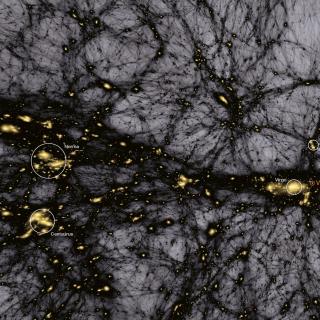Bibcode
López-Corredoira, M.; Calvo-Torel, J. I.
Bibliographical reference
International Journal of Modern Physics D
Advertised on:
8
2022
Citations
8
Refereed citations
8
Description
With data from Pantheon, we have at our disposal a sample of more than a 1000 supernovae Ia covering a wide range of redshifts with good precision. Here, we make fits to the corresponding Hubble-Lemaître diagram with various cosmological models, with intergalactic extinction, evolution of the luminosity of supernovae, and redshift components due to partially noncosmological factors. The data are well fitted by the Standard Model to include dark energy, but there is a degeneracy of solutions with several other variables. Therefore, the Hubble-Lemaître diagram of SNe Ia cannot be used alone to infer the existence of the accelerated expansion scenario with dark energy. Within this degeneracy, models that give good fits to the data include the following alternative solutions: Einstein-de Sitter with gray extinction aV = 1.2 × 10−4Mpc−1; linear Hubble-Lemaître law static Euclidean with gray extinction aV = 0.4 × 10−4Mpc−1; Static Euclidean with tired light and gray extinction aV = 2.8 × 10−4Mpc−1; Einstein-de Sitter with absolute magnitude evolution α = −0.10 mag Gyr−1; Friedmann model with ΩM = 0.07 − 0.29, ΩΛ = 0 and partially noncosmological tired-light redshifts/blueshift with attenuation/enhancement |Ki| < 2.2 × 10−4Mpc−1 (although requiring calibration of M incompatible with local SNe measurements).
Related projects

Cosmology with Large Scale Structure Probes
The Cosmic Microwave Background (CMB) contains the statistical information about the early seeds of the structure formation in our Universe. Its natural counterpart in the local universe is the distribution of galaxies that arises as a result of gravitational growth of those primordial and small density fluctuations. The characterization of the
FRANCISCO SHU
KITAURA JOYANES